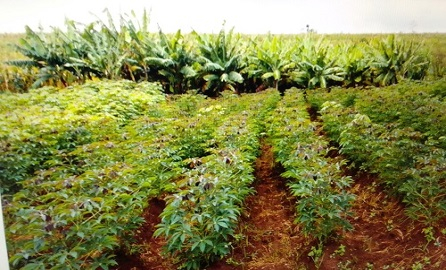SCHOOL NUTRITION GARDENS (SNG) PROJECT The School Nutrition Gardens (SNG) project aims to promote healthy eating habits among children by encouraging schools to establish organic vegetable gardens. Students will learn how to grow...
Description
Women in Tanzania form the backbone of the agricultural sector, contributing significantly to food production, household income, and community development in Tanzania. 67% of working women are employed in agriculture, predominantly engaging in small-scale farming, tending to both crops and livestock.
Women ensure food for their families and bolster food availability in the region. They play a crucial role in the entire agricultural value chain – from planting and harvesting to processing and marketing. Moreover, their involvement in agriculture also significantly impacts household income, with women often reinvesting earnings into their families contributing to education, healthcare, and improved living standards, prioritizing the welfare of their families and communities.
Challenges that women face in rural Tanzania
Despite their pivotal role in family and community life, women in rural areas face various challenges, encompassing environmental, economic, social, and political factors. Environmental challenges, such as the effects of climate change, degrading soils, lack of natural resource management, and agro ecological farming methods, are not directly gender-related but disproportionately affect women, given their predominant engagement in agriculture.
Some specifically gender-related challenges include:
-
lack of finance
-
limited access to resources like land
-
limited access to markets
-
unremunerated workload
-
exclusion from decision-making
Morogoro Women in Agriculture and Business Initiative (MWABI)
Africa Child Foundation Mission of Tanzania is tackling these challenges within the Morogoro Women in Agriculture and Business Initiative (MWABI). Since the project’s first phase (2021-2022), MWABI empowers women in the Morogoro Region through training in organic agriculture, small business and saving and lending methods to create climate resilience, increase food security and gender equality.
The project’s second phase (2023- 2030) Shall include builds on its initial success, ensuring sustained support for smallholder farmers, particularly women, adopting climate-resilient practices and engaging in entrepreneurial activities. Smallholder farmers, some of them shall be organized into a model-cooperative during the project's first phase, continue to be motivated and supported to practice organic agriculture, engaging in value addition and entrepreneurial activities. The model-cooperative, shall be managed by the majority of women (70%), coordinates production, stores, processes goods, and markets organic agriculture products.
Climate resilience through agroecological practices
To increase climate resilience, ACFMT trains female smallholder farmers, who are affected by erratic rainfall, persistent droughts, and deteriorating soil health, in agro ecological practices. In workshops and trainings, ACFMT teaches methods and best practices such as agroforestry, farmer managed natural regeneration (a reforestation method), and farming God’s way (a conservation agriculture method) to conserve the environment and reduce pressure on the natural resources. ACFMT also introduced energy-saving stoves. These are now built by the women and run as an enterprise helping to sustain themselves.
Meanwhile, the MWABI women have already planted 9500 trees and constructed 789 energy saving stoves to protect trees by using less firewood.
Establishment of Women ACFMT Saving and Lending Group Model
A specifically gender-related challenge is the lack of finance. It is common for women to hand over earnings to their husband or other male family members who sometimes don’t use it for the benefit of the family. Often, they are also requested to contribute financially to events such as funerals or weddings of the extended family and community. Keeping bigger amounts of money at home comes with additional security issues. This creates difficulties in saving and reinvesting their earnings. To address these difficulties, the ACFMT Saving and Lending Group (SSLG) Model has been introduced in MWABI to increase women’s access to financial services through saving and lending groups. The SSLG Model is based on the Village Saving and Lending Associations system.
The SSLG Model - How it works in the context of MWABI:
The money savings go into a box which is locked three times and three different group members are in charge of one key each.
-
ACFMT Women Saving and Lending groups are formed.
-
Women meet weekly to contribute their shares to a business and social fund. The money goes into a box, which is locked three times. Three group members elected from the group are in charge of one key each. The box is stored in the safest house of the village.
-
If a woman asks for a loan, the group decides together, thus ensuring full transparency. The loan shall not be more than three times of the woman's savings.
-
When a woman asks for a loan, it must have a business-related purpose, such as buying land or tools for agriculture.
-
The loans must be repaid within one to three months. There is an annual cut. At the end of the year, the box is opened ceremoniously by the women, and shares are given back to the group members.
-
Apart from that, the system also includes a social fund to help in case of sickness, childbirth, etc. Money from the social fund does not have to be paid back.
Within the initiative, we are planning to establish 98 saving and lending groups which will have 830,415,000 TZS (332.166 EUR) cumulative savings circulating as micro-loans within the groups. Through MWABI project, 3 APEXES with 20 saving and lending groups will be formed and be registered.
Women will acquire leadership skills through ACFMT training on group dynamics and leadership, and all 98 groups will be led by women. They will save through their groups, acquire loans, and invest in income-generating activities for livelihood improvement. The weekly meetings will serve as innovation accelerators, where women will pitch new businesses which they will got loan to start a business. Furthermore, these meetings foster cohesion among the women, not only in business terms.





